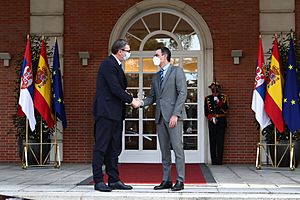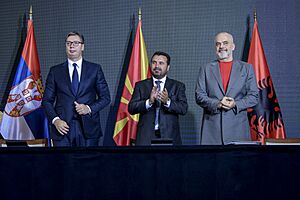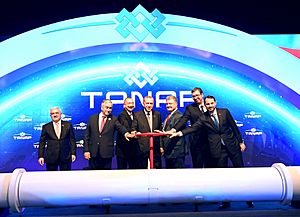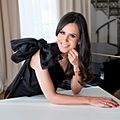Aleksandar Vučić facts for kids
Quick facts for kids
Aleksandar Vučić
|
|
|---|---|
| Александар Вучић | |
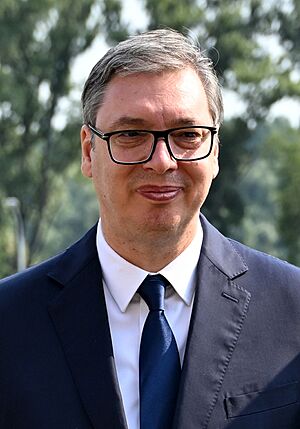
Vučić in 2024
|
|
| President of Serbia | |
| Assumed office 31 May 2017 |
|
| Prime Minister | Ivica Dačić (acting) Ana Brnabić Ivica Dačić (acting) Miloš Vučević |
| Preceded by | Tomislav Nikolić |
| Prime Minister of Serbia | |
| In office 28 April 2014 – 31 May 2017 |
|
| President | Tomislav Nikolić |
| Deputy | Ivica Dačić Rasim Ljajić Zorana Mihajlović Kori Udovički Nebojša Stefanović |
| Preceded by | Ivica Dačić |
| Succeeded by | Ivica Dačić (acting) Ana Brnabić |
| First Deputy Prime Minister of Serbia | |
| In office 27 July 2012 – 27 April 2014 |
|
| Prime Minister | Ivica Dačić |
| Preceded by | Office established |
| Succeeded by | Ivica Dačić |
| Minister of Defence | |
| In office 27 July 2012 – 2 September 2013 |
|
| Prime Minister | Ivica Dačić |
| Preceded by | Dragan Šutanovac |
| Succeeded by | Nebojša Rodić |
| Minister of Information | |
| In office 24 March 1998 – 24 October 2000 |
|
| Prime Minister | Mirko Marjanović |
| Preceded by | Radmila Milentijević |
| Succeeded by | Ivica Dačić Biserka Matić-Spasojević Bogoljub Pejčić |
| Personal details | |
| Born | 5 March 1970 Belgrade, SR Serbia, SFR Yugoslavia |
| Political party | SRS (1993–2008) SNS (2008–present) |
| Spouses |
Ksenija Janković
(m. 1997; div. 2011)Tamara Đukanović
(m. 2013) |
| Children | 3 |
| Parents |
|
| Relatives | Andrej Vučić (brother) |
| Alma mater | University of Belgrade |
| Signature |  |
Aleksandar Vučić (born 5 March 1970) is a Serbian politician. He has been the president of Serbia since 2017. He is a member of the Serbian Progressive Party (SNS). Before becoming president, he was the Prime Minister of Serbia from 2014 to 2017. He also served as the first deputy prime minister from 2012 to 2014.
About Aleksandar Vučić
Early Life and Education
Aleksandar Vučić was born in Belgrade, which is the capital city of Serbia. His parents are Anđelko Vučić and Angelina Milovanov. He has a younger brother named Andrej.
His family on his father's side came from a place called Čipuljić. They had to leave their homes during World War II and settled near Belgrade. His mother was born in Bečej. Both of his parents studied economics. His father worked as an economist, and his mother was a journalist.
Vučić grew up in New Belgrade. He went to elementary school there and later to a high school in Zemun. He studied law at the University of Belgrade. He also learned English in Brighton, England. For a short time, he worked in London. After returning to Yugoslavia, he worked as a journalist. His relatives' homes were destroyed during the Bosnian War.
Political Journey
Vučić started his political career in 1993. He became a member of the Serbian Radical Party (SRS) in the National Assembly of Serbia. In 1995, he became the secretary-general of the SRS. He was made Minister of Information in 1998.
After 2000, he became a well-known figure in the Serbian opposition. In 2008, he left the SRS with Tomislav Nikolić and helped start the Serbian Progressive Party (SNS). He was the deputy president of SNS at first. The SNS became the biggest party in the 2012 election. They formed a government with the Socialist Party of Serbia. Vučić became the first deputy prime minister. He was also elected president of the SNS.
He played a key role in talks between Kosovo and Serbia. These talks were helped by the European Union (EU). He supported an agreement to make their relations more normal. Vučić became prime minister in 2014.
As prime minister, Vučić worked on Serbia joining the EU. He sold state-owned businesses and made the economy more open. In 2017, he was elected president of Serbia. He was re-elected in 2022.
President of Serbia (2017–Present)
Vučić became President of Serbia on 31 May 2017. He promised to continue making improvements in the country. He also said Serbia would stay on a path towards Europe. Vučić stated that Serbia would remain neutral in military matters. However, it would still work with both NATO and Russia.
Economy and Growth
After becoming Prime Minister in 2014, Vučić focused on economic policies. These policies aimed to lower Serbia's budget deficit. He reduced pensions and salaries in the public sector. He also stopped new hiring in government jobs.
In 2015, Serbia made an agreement with the IMF (International Monetary Fund). This agreement helped to make the country's finances stable. The IMF and the EU praised these changes. They called them very successful. Serbia's economy has grown, and salaries have increased. The country's debt is also getting lower.
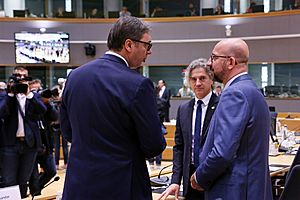
EU and Immigration
During the 2015–2016 European migrant crisis, Vučić supported Germany's policies. He praised German Chancellor Angela Merkel for her approach to migrants. Vučić said Serbia would help the EU with migrants. He also said Serbia would take in some migrants. He stated that Serbia would not build fences, unlike some other countries.
Relations with Kosovo
Vučić was important in the talks about Serbia joining the EU. He traveled to Brussels for discussions with EU officials. He also visited North Mitrovica to talk about a political solution for Kosovo. He asked Serbs in Kosovo to look to the future.
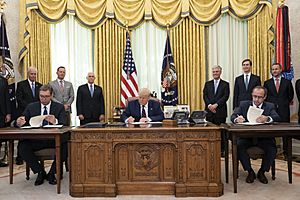
In 2020, Serbia and Kosovo agreed to start flights between their capitals again. This was the first time in over 20 years. This deal happened after talks led by Richard Grenell from the United States. On 4 September 2020, Serbia and Kosovo signed an economic agreement at the White House.
Open Balkan Initiative
On 10 October 2019, Vučić signed a deal with leaders from Albania and North Macedonia. This deal is called Open Balkan. It aims to improve economic cooperation in the region. It allows for the free movement of goods, money, services, and workers. This is similar to the European Single Market. The leaders hope this will help their countries join the EU. Other countries in the region might also join this initiative.
Relations with Russia
Vučić has kept good relations between Serbia and Russia. His government has not put sanctions on Russia. Vučić has said that Serbia will continue to work towards joining Europe. But it will also keep its historical ties with Russia. Serbia has also increased its trade with Russia.
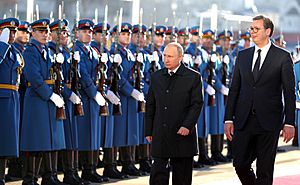
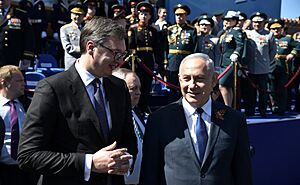
Relations with the United States and China
In 2017, Vučić visited the United States. He met with U.S. Vice President Mike Pence. They talked about U.S. support for Serbia joining the EU. They also discussed the need for more reforms.
Vučić has also worked to have closer ties with China. He has met with Chinese President Xi Jinping several times. China helped Serbia during the COVID-19 pandemic in Serbia. They sent protective equipment and vaccines. In 2023, Serbia and China signed a free-trade deal.
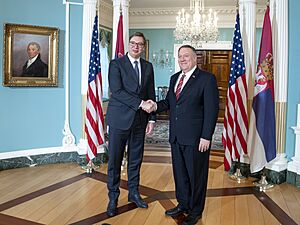
Personal Life
Aleksandar Vučić is 198 cm (about 6 feet 6 inches) tall. This makes him one of the tallest world leaders.
He married Ksenija Janković in 1997. She was a journalist. They had two children and later divorced in 2011. Ksenija passed away in 2022. In 2013, Vučić married Tamara Đukanović. She is a diplomat. They had a son in 2017, shortly after he became president.
Besides Serbian, he can speak Russian, English, and German. He learned Russian in high school and continued to improve it.
Awards and Honors
Orders and Decorations
| Award or decoration | Country | Date | Place | |
|---|---|---|---|---|
| Order of the Republika Srpska | → |
15 February 2018 | Banja Luka | |
| Order of Makarios III | 20 May 2018 | Nicosia | ||
| Order of Friendship | 9 October 2018 | Astana | ||
| Order of Alexander Nevsky | 17 January 2019 | Palace of Serbia, Belgrade | ||
| Order of St. Sava | Serbian Orthodox Church | 8 October 2019 | Sava Centar, Belgrade | |
| Order of the White Lion | 18 May 2021 | Prague | ||
| Order of the Venerable Prohor Pčinjski | Serbian Orthodox Church | 13 June 2021 | Vranje | |
| Order of Saint-Charles | 22 February 2022 | Monaco City | ||
| Order of the Eparchy of Buda | Serbian Orthodox Church | 19 August 2023 | Szentendre | |
| Order of the Slovak Evangelical Church | Slovak Evangelical Church | 13 December 2023 | Novi Sad | |
| Hungarian Order of Merit | 23 August 2024 | Budapest | ||
Honorary Doctorates
| Date | University | Note |
|---|---|---|
| 2017 | Moscow State Institute of International Relations | |
| 2018 | Azerbaijan University of Languages |
Honorary Citizenship
| Country | City | Date |
|---|---|---|
| Honorary citizen of Leskovac | 10 October 2013 | |
| Honorary citizen of Novi Pazar | 20 April 2015 | |
| Honorary citizen of Krupanj | 24 July 2015 | |
| Honorary citizen of Svrljig | 8 May 2017 | |
| Honorary citizen of Loznica | 16 June 2018 | |
| Honorary citizen of Trebinje | 22 October 2018 | |
| Honorary citizen of Drvar | 21 July 2019 | |
| Honorary citizen of Sokolac | 29 July 2019 | |
| Honorary citizen of Aleksandrovac | 7 February 2020 | |
| Honorary citizen of Banja Luka | 22 April 2021 | |
| Honorary citizen of Šabac | 22 April 2021 | |
| Honorary citizen of Smederevska Palanka | 28 June 2021 | |
| Honorary citizen of Zvečan | 12 July 2021 | |
| Honorary citizen of Valjevo | 28 July 2021 | |
| Honorary citizen of Jagodina | 29 September 2021 | |
| Honorary citizen of Rekovac | 17 October 2021 | |
| Honorary citizen of Gradiška | 18 April 2022 | |
| Honorary citizen of Gornji Milanovac | 23 April 2023 | |
| Honorary citizen of Kladovo | 27 April 2023 | |
| Honorary citizen of Subotica | 6 July 2023 | |
| Honorary citizen of Sjenica | 16 August 2023 | |
| Honorary citizen of Prijepolje | 7 July 2024 | |
| Honorary citizen of Stanari | 27 August 2024 |
Other Awards
- Gold Medal of Merit of the City of Athens
- Friends of Zion Award
- The key of the city of Banja Luka, 2021
- The Great Cross of vožd Đorđe Stratimirović, 2021
- The Hippocratic Medal, for contributions to healthcare, 2022
- Gold Medal for Merit, First Class, Security Intelligence Agency, 2024.
Images for kids
-
Vučić with US Vice President Mike Pence in 2017.
-
President Aleksandar Vučić with Prime Minister of India, Narendra Modi.
-
Vučić attending the commemoration of the 20th anniversary of the Srebrenica massacre in 2015.
See also
 In Spanish: Aleksandar Vučić para niños
In Spanish: Aleksandar Vučić para niños
 | Dorothy Vaughan |
 | Charles Henry Turner |
 | Hildrus Poindexter |
 | Henry Cecil McBay |


